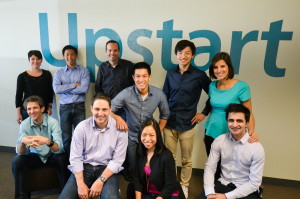This idea is simple to explain, but the implications are much more complex and murky. Take a young, 20-something college graduate and use the kind of information they would put on a résumé (college degree, GPA, etc.) to predict their future earnings over the next 10 years. Then, offer them a lump-sum payment now in exchange for a percent of those earnings.
It sounds a bit like science fiction (very good science fiction, in fact), but it’s actuallya real-live business named Upstart (that’s them in the photo) that is already earning candidates an average of $50,000 now in return for a slice of their future successes. On the one hand, it’s a great solution to a frustrating problem. Smart young grads have a ton of potential, but they are also liquidity-constrained. Borrowing from their future to kickstart their careers makes a lot of sense. It makes sense to investors, too, with a targeted rate of return in the range of 8-9%.
But it also looks a little bit like indentured servitude. Of course it isn’t, not today anyway. For one thing, there are safeguards: no more than 7% of income can be taxed, and there’s a cap on how much you have to pay out if you strike it rich and sell a business for $100m. For another, the entire dynamic is inverted: instead of down-and-out, vulnerable people the service is targeted towards those with the best degrees and the most options.
Here’s a video from Upstart, the name of the company, explaining what they do.
This is one of those articles that I think catches a real glimpse of ways the future might be totally different from what we’re used to, but not based on what you normally think of when you think of futuristic inventions.

I had a retired admiral (I think) tell me one time that businesses should reverse the way they do things, paying more to young families who are just starting out in an effort to win loyalty (or just make them sign an contract to work for x years). Instead of working somewhere for 2-5 years and changing jobs they should work there for 15 or 20, but over the years their pay would go down because they would need it less. Essentially the idea he had was to start them out with $1 mil, but they’d be tied to that company for 20 years. I know it’s not economically feasible, but something along this concept goes with what this company is doing.
If I had a nice enough degree (maybe when I get a masters?) I’d do this in a heartbeat. The real key is knowing how to manage money, and now that I have properly been taught how this would make a great deal of sense.